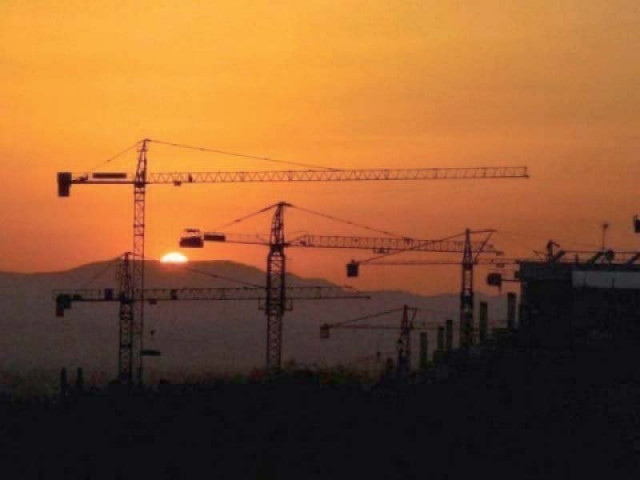Development spending remains at 27% of allocation
Govt commits to fully utilise remaining funds before June to propel growth

A visiting IMF delegation met with Umar and discussed issues related to development spending and pro-poor expenditures. PHOTO: FILE
The government has shown the commitment to fully spend Rs701 billion on development amid the International Monetary Fund's (IMF) emphasis on ensuring that the development spending remains on track.
Unlike past programmes, this time the IMF is keen that Pakistan fully utilises the development budget and also honours its debt servicing commitments.
Public Sector Development Programme (PSDP) expenditures from July through January of the current fiscal year were in line with the historical trends, said Federal Minister for Planning and Development Asad Umar on Friday while addressing his first press conference as the planning minister.
Rs420 million released for uplift projects
The minister also hinted at some positive development on the $9.2-billion Mainline-I project of the China-Pakistan Economic Corridor (CPEC), hoping that a major breakthrough might be achieved in April.
The chairman of China's National Development and Reforms Commission is expected to visit Pakistan in April.
The minister said the Pakistan Tehreek-e-Insaf (PTI) government spent Rs188 billion on development work in seven months, which was equal to 27% of the annual budget of Rs701 billion.
He said it was the second highest spending trend in the past five years, which affirmed the government's commitment to fully utilise the budget.
The Rs188-billion spending was also higher by 35% or Rs49 billion as compared to the same period of last fiscal year.
A visiting IMF delegation also met with Umar on Friday and discussed the issues related to development spending, pro-poor expenditures under the Benazir Income Support Programme (BISP) and Sustainable Development Goals.
The minister addressed the press conference in order to reply to questions about the government's commitment to development activities amid concerns that the government may not be able to fully utilise the funds due to the shortfall in tax revenues.
Parliamentarians and government allies have also complained about the lack of development activities, which are at the centre in Pakistan's constituency politics.
Umar said he would make sure that the government fully utilised the annual budget of Rs701 billion.
In PTI's first year, the development spending remained at only Rs562 billion, which was the lowest in four years in absolute terms. It was also the lowest in 29 years in terms of the size of the economy, standing at 1.1% of gross domestic product (GDP).
From July through January of the current fiscal year, the federal government spent on an average Rs850 million per day. The ratio has to be increased by more than two and a half times to make sure that average daily spending remains at Rs3.4 billion to fully utilise the Rs701-billion budget.
The minister said in the first seven months, the Ministry of Planning had already authorised Rs429 billion for development spending, which showed the government's commitment to fully utilise the funds.
After economic activities came to a standstill, Prime Minister Imran Khan directed over two months ago to utilise the development budget.
As of November, the federal government had utilised only Rs87 billion but after Umar became the planning minister, the spending increased by over Rs100 billion in two months.
Similarly, in Punjab the development spending was only Rs69 billion as of the end of December.
Some federal ministers, including Fawad Chaudhry, Minister for Science and Technology, agitated against the low spending, particularly in central and north Punjab. This resulted in increased spending within three weeks and the Punjab government utilised Rs106 billion by January 17.
Umar also spoke about the projects being executed under the China-Pakistan Economic Corridor (CPEC).
He said World Bank consultants were reviewing the $9.2-billion ML-I project and their report on the project structure was expected by the second half of current month.
Railways Minister Sheikh Rashid Ahmad has categorically stated that survival of Pakistan Railways hinged upon the implementation of ML-I project.
Umar said the development agreement for the Rashakai Special Economic Zone of CPEC had been reached with the Chinese company (CRBC).
The bidding process for the Dhabeji Special Economic Zone has commenced and the groundbreaking was performed at the Allama Iqbal Special Economic Zone Faisalabad last month.
Planning Secretary Zafar Hasan spoke about the progress on individual projects. He gave details of reconstruction of the Nishtar Road and Manghopir Road, reconstruction of Manghopir Road from Jam Chakro to Banaras and construction of a flyover at Sakhi Hassan, Five-Star, KDA Roundabout along Sher Shah Suri Road.
Hasan said out of 1,034 ongoing projects, about 171 would be completed by June this year.
Govt considers stopping tax collection for FBR
He said 26,000 acres of additional irrigated land had been added by Kachhi Canal phase-1 in Sui district of Balochistan and by June 2020 a further 25,000 acres will be added.
Makhi-Farash link canal to supply water for Thar coal, in Sindh, earthwork has been completed and is presently started supply of 20 cusecs and will supply 200 cusecs of water by July 2020.
The Havelian Mansehra section of KKH Phase-2 (Thakot-Havelian) was completed and inaugurated by Prime Minister late last year and Sukkur-Multan motorway (392 km) was opened for traffic in November 2019 after inauguration by the prime minister. Both these projects are part of CPEC.
Published in The Express Tribune, February 8th, 2020.
Like Business on Facebook, follow @TribuneBiz on Twitter to stay informed and join in the conversation.



















COMMENTS
Comments are moderated and generally will be posted if they are on-topic and not abusive.
For more information, please see our Comments FAQ